Last updated on July 17th, 2023 at 04:21 pm
Contents
- 1 Understanding the Lifespan of Cigars and How Long They Last
- 1.1 Understanding Cigar Creation and Preservation
- 1.2 The Lifespan of Cigars: A Detailed Examination
- 1.3 How to Store Cigars: Ensuring Longevity and Quality
- 1.4 Choosing the Right Humidor: A Key to Cigar Preservation
- 1.5 Cigars and Humidity: A Crucial Relationship
- 1.6 Do Cigars Expire? Unraveling the Truth
- 1.7 Wrapping Up: The Art of Preserving Cigars
- 1.8 Frequently Asked Questions about Cigars and Their Lifespan
Understanding the Lifespan of Cigars and How Long They Last
Hey cigar enthusiasts and novices alike! Today, we’re diving deep into a question that’s often asked but rarely answered in full detail: “How long do cigars last?” This intriguing topic is more complex than it seems, and we’re here to unravel it for you!
In this comprehensive guide, we’ll explore the lifespan of cigars, the factors that influence them, and the importance of proper storage. We’ll also discuss the role of humidors and how to choose the right one for your precious cigar collection.
So, whether you’re a seasoned aficionado or a curious beginner, this blog post is written to enlighten you. By the end, you should be well-equipped to enjoy your cigars at their best for as long as possible. Let’s fire this one up, shall we?
Understanding Cigar Creation and Preservation
In this journey of understanding cigars, we’ll uncover the artistry and tradition behind these symbols of luxury. From the careful selection of tobacco leaves to the skilled hands that roll them into a masterpiece, each step is a testament to craftsmanship.
We’ll also explore the factors that influence a cigar’s lifespan, including smoking frequency, type of cigar, and storage conditions. This knowledge will not only deepen your appreciation for cigars but also guide you in preserving their quality for the longest possible time.
From Tobacco Leaf to Hand-Rolled Masterpieces
Cigars are more than just a symbol of luxury; they’re a testament to a rich tradition of craftsmanship. At their core, cigars are bundles of dried, fermented tobacco leaves.
The journey of a cigar begins with the cultivation of tobacco plants. After harvesting, the leaves undergo a curing process where they are dried, causing them to transition from green to brown. This is followed by fermentation, a critical step that enhances the flavor and aroma of the cigars.
Once fermented, the leaves are sorted based on their color and size. The selected leaves are then rolled into a cigar by skilled artisans known as torcedores.
This process involves three types of leaves: the filler, which forms the core of the cigar; the binder, which holds the filler in place; and the wrapper, usually the highest quality leaf, which encases the entire cigar.
This intricate process results in the creation of a cigar, a product of patience, skill, and knowledge.
Influencing Factors and Optimal Storage Conditions
The lifespan of a cigar isn’t merely a measure of time; it’s a reflection of various influencing factors. One such factor is how fast you smoke. Like a fine wine, a cigar is meant to be savored, not rushed. The faster a cigar is smoked, the shorter its lifespan tends to be.
The type of cigar also plays a significant role. Hand-rolled cigars, particularly those hailing from Cuba, are renowned for their longevity. This is largely due to their superior construction and the quality of the ingredients used.
However, the most critical factor that determines a cigar’s lifespan is its storage conditions. Cigars are delicate, requiring a specific level of humidity and temperature to maintain their quality. This is where a humidor comes into play, providing a controlled environment that prevents cigars from becoming too dry or too moist.
In the sections to follow, we’ll expand deeper into the art of cigar storage, helping you understand how to create the ideal conditions for your cigars to thrive. This knowledge is essential to ensuring your cigars not only last longer but also maintain their optimal flavor and quality.
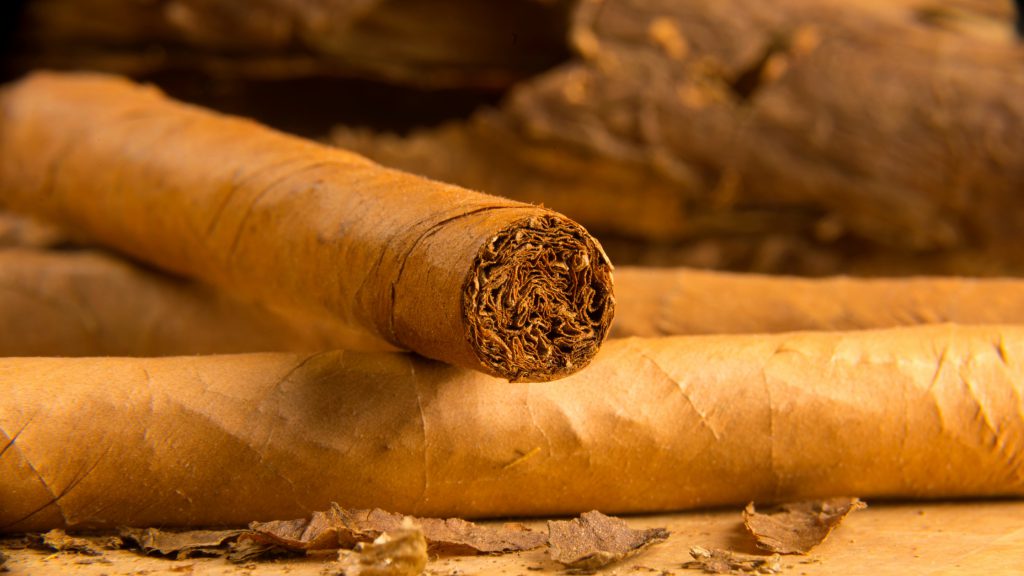
The Lifespan of Cigars: A Detailed Examination
The lifespan of cigars is a fascinating subject, filled with complexities. Much like the cigars themselves, their longevity is a product of various factors, intricately intertwined.
From the type of cigar to the conditions in which it’s stored, each aspect plays a role in determining how long a cigar can maintain its quality and flavor.
While a well-preserved cigar can potentially last for years or even decades, without proper care, its lifespan can be significantly shortened to weeks or even days!
Unraveling the General Lifespan of Cigars
Cigars, in their essence, are a product of careful fermentation and aging. This process, akin to the maturation of fine wines, allows cigars to improve with age under the right conditions.
A well-stored cigar kept at the optimal temperature and humidity, can maintain its quality and flavor for many years.
However, without such care, a cigar’s lifespan can be drastically reduced. A cigar exposed to the open air, for instance, can dry out and lose its flavor within a few days.
This stark contrast underscores the importance of proper storage in preserving a cigar’s lifespan.
The Influence of Quality and Origin on Cigar Lifespan
The lifespan of a cigar is not solely determined by its storage conditions. The quality of the cigar itself, including its construction and the materials used, plays a significant role.
High-quality, hand-rolled cigars, particularly those originating from renowned regions like Cuba, are celebrated for their longevity. These cigars are crafted with meticulous attention to detail and high-quality tobacco, factors that contribute to their extended lifespan.
Conversely, cigars made with lower-quality materials and less careful construction may not last as long, even when stored properly.
This variation in lifespan serves as a reminder of the importance of choosing quality cigars and storing them correctly to enjoy them at their best for as long as possible.
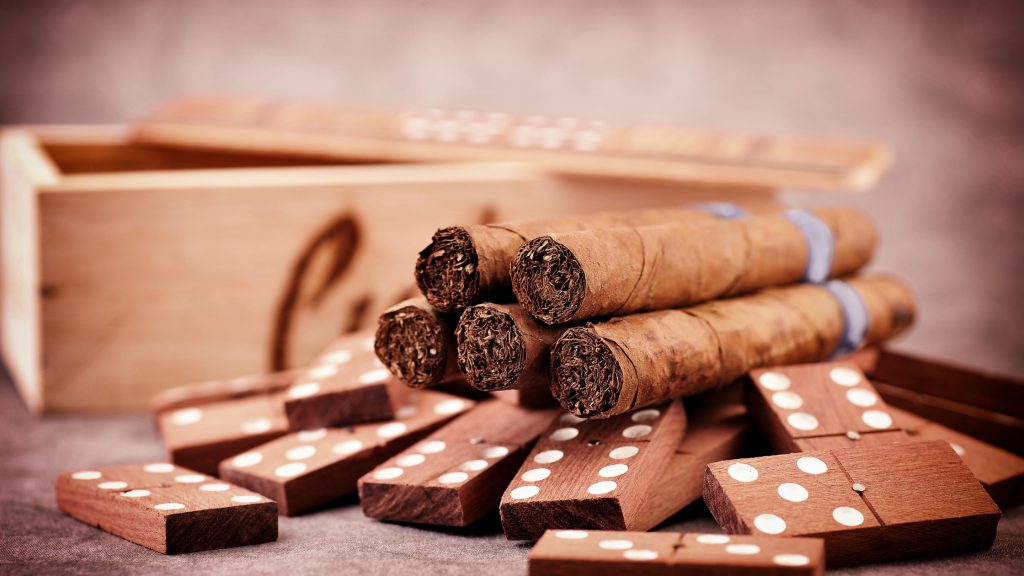
How to Store Cigars: Ensuring Longevity and Quality
Proper storage of cigars is an art in itself, requiring knowledge, precision, and a keen understanding of the delicate nature of cigars.
The way cigars are stored can significantly impact their lifespan and the preservation of their unique flavors and aromas.
In this section, we’ll discuss the specifics of how to store cigars properly, the role of a humidor, and the impact of these factors on a cigar’s lifespan.
The Art of Storing Cigars: A Detailed Guide
Storing cigars properly is crucial to maintaining their quality over time. The first step is to ensure that your cigars are kept at the right temperature and humidity.
Ideally, cigars should be stored at a temperature of about 68-70 degrees Fahrenheit and a relative humidity of 70-72%. This mimics the tropical climates where most cigar tobacco is grown.
Cigars should also be stored away from direct sunlight and strong odors, as these can affect the flavor of the tobacco. It’s also important to handle cigars gently to avoid damaging the wrapper.
Finally, cigars should be rotated every few months within their storage to ensure even humidity distribution.
The Role of a Humidor in Preserving Cigars
A humidor is a cigar enthusiast’s best friend. It’s a specially designed storage box that maintains a constant humidity level, providing an ideal environment for cigars.
Humidors are often lined with Spanish cedar, a type of wood that is excellent at retaining moisture and repelling insects. The cedar also imparts a pleasant aroma to the cigars.
Humidors come in various sizes, from small travel-sized cases to large cabinets. Regardless of size, a good humidor should have a tight seal to keep the humidity constant.
It’s also important to monitor the humidity levels regularly using a hygrometer to ensure they stay within the ideal range.
The Lifespan of Cigars in a Humidor
With proper care and the right storage conditions provided by a humidor, cigars can last for many years without losing their quality.
The controlled environment within a humidor helps to preserve the cigar’s flavor, aroma, and structure, effectively extending its lifespan.
However, the exact length of time a cigar can last in a humidor can vary. Factors such as the type of cigar, its initial quality, and how the humidor is maintained can all influence a cigar’s lifespan.
Overall, with regular care and attention to maintaining the right humidity and temperature, a humidor can help ensure your cigars remain enjoyable for years, even decades.
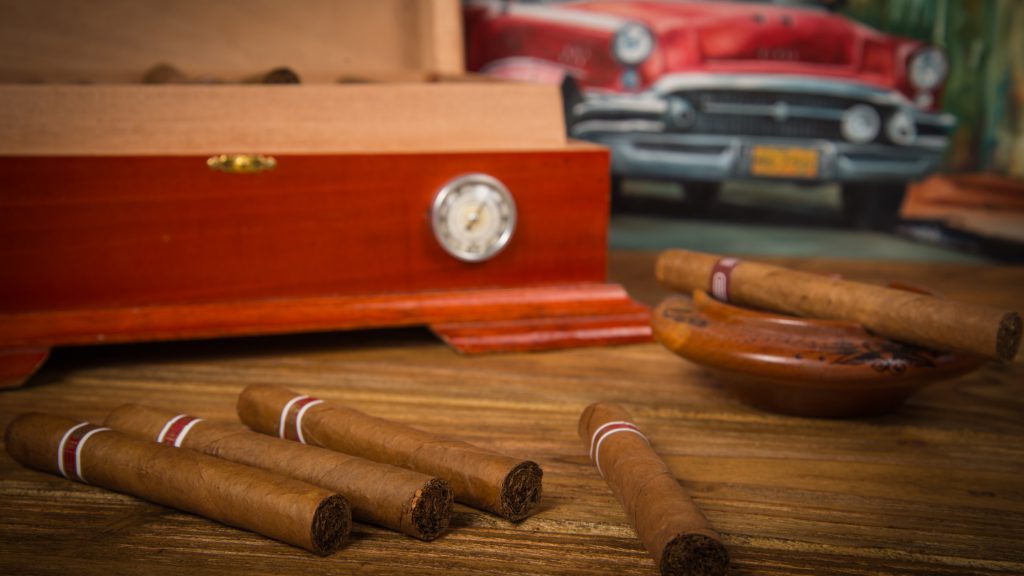
Choosing the Right Humidor: A Key to Cigar Preservation
Selecting the right humidor is a crucial step in the journey of any true cigar smoker. A humidor isn’t just a storage box; it’s a carefully designed environment that helps maintain the quality and extend the lifespan of your cigars.
In this section, we’ll explore what a humidor is, how it works, and how to choose the right one. We’ll also discuss the benefits of a travel humidor for those who enjoy their cigars on the go.
Understanding Humidors: What They Are and How They Work
A humidor is a specially designed-storage container for cigars. Its primary function is to maintain a stable humidity level, typically around 70-72%, which is crucial for preserving the quality of cigars.
Most humidors are lined with Spanish cedar, a type of wood that retains moisture well and imparts a pleasant aroma to the cigars.
Humidors work by using a humidification system, which adds or removes moisture to maintain the desired humidity level.
This system can be as simple as a sponge soaked in distilled water, or as complex as an electronic humidifier.
A hygrometer, often built into the humidor, measures the humidity level to ensure it stays within the ideal range.
Selecting the Right Humidor for Your Cigars
Choosing the right humidor depends on several factors. To begin, consider the number of cigars you plan to store. Humidors come in various sizes, from small boxes that hold a few dozen cigars, to large cabinets that can store hundreds.
The quality of the humidor is also important. Look for a well-constructed humidor with a tight seal to maintain constant humidity. The interior should be lined with Spanish cedar or a similar wood that retains moisture well.
Lastly, consider the type of humidification system and hygrometer. While manual systems can work well, you may prefer the convenience and precision of electronic devices, especially for larger humidors.
The Benefits of a Travel Humidor
For cigar enthusiasts who travel frequently, a travel humidor is a valuable investment. These compact humidors are designed to protect a small number of cigars from damage and maintain their humidity during travel.
Travel humidors are typically hard-sided and have airtight seals to protect against changes in pressure and humidity.
They often include foam inserts to keep the cigars secure and prevent them from moving around. With a travel humidor, you can enjoy your favorite cigars at their best, no matter where your travels take you.
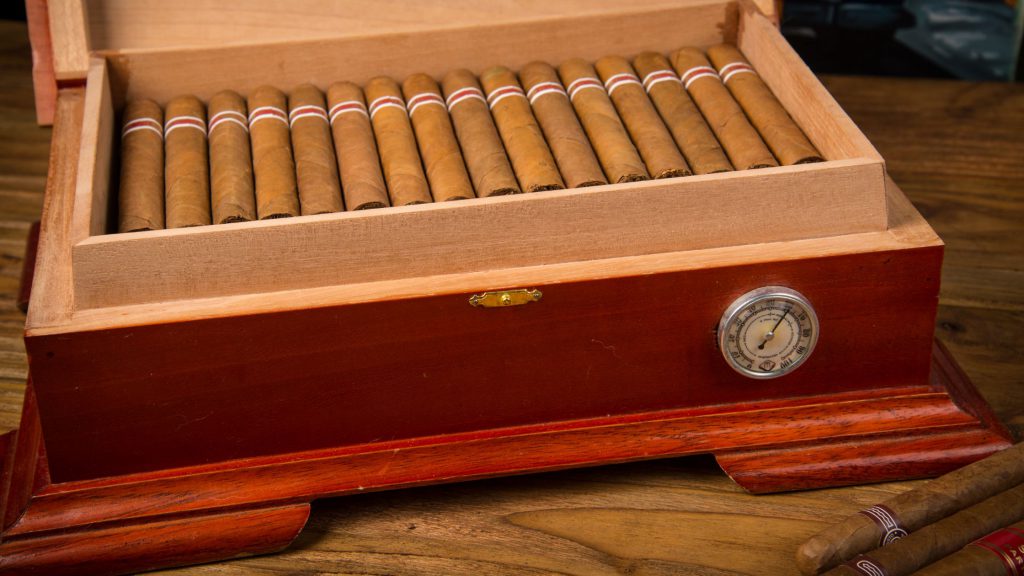
Cigars and Humidity: A Crucial Relationship
Humidity plays a pivotal role in the life of a cigar. It influences not just the cigar’s longevity, but also its flavor, burn, and overall smoking experience.
In this section, we’ll talk about the intricate relationship between cigars and humidity, and discuss how to maintain the right humidity levels in a humidor.
The Bond Between Cigars and Humidity
Cigars have a unique relationship with humidity. They’re hygroscopic, meaning they absorb and retain moisture from their surroundings. This characteristic is crucial to maintaining a cigar’s quality.
Too much humidity can make a cigar hard to light and cause it to burn unevenly. It can also lead to mold growth and tobacco beetle infestations. On the other hand, too little humidity can cause a cigar to dry out, leading to a harsh taste and a fast, hot burn.
The ideal humidity level for cigars is typically between 68% and 72%. As mentioned above, this range closely mimics the tropical climates where cigar tobacco is grown and fermented, helping to preserve the cigar’s flavor and structure.
Maintaining the Right Humidity Levels in a Humidor
Maintaining the right humidity levels in a humidor is a delicate balancing act. It involves adding or removing moisture as needed to maintain the ideal range.
This is typically achieved using a humidification system, which can range from a simple sponge to an advanced electronic device.
To monitor the humidity level, a hygrometer is used. This device measures the amount of moisture in the air inside the humidor. Many humidors come with a built-in hygrometer, but standalone units can also be purchased.
It’s important to regularly check the hygrometer and adjust the humidification system as needed. If the humidity level falls below the ideal range, distilled water or a humidification solution can be added to increase it.
If the level is too high, you can leave the humidor open briefly to let some moisture escape. Regular maintenance is key to ensuring your humidor provides the ideal environment for your cigars.
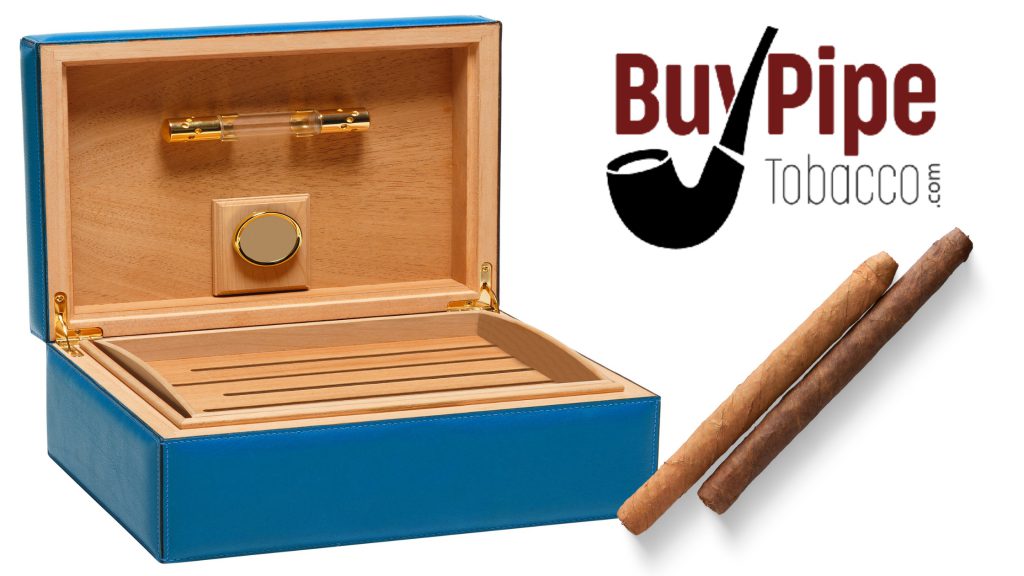
Do Cigars Expire? Unraveling the Truth
The question of whether cigars expire is a common one among both new and seasoned cigar smokers. The answer, however, isn’t as straightforward as it might seem.
In this section, we’ll explore the concept of cigars expiring and discuss the signs that a cigar may no longer be in good condition.
The Lifespan of Cigars: Do They Really Expire?
Unlike food or medicine, cigars don’t have a set expiration date. Instead, their lifespan is largely determined by how they’re stored. With proper storage in a well-maintained humidor, cigars can last for years or even decades without losing their quality or flavor.
However, this doesn’t mean cigars can’t “expire” in a sense. If cigars aren’t stored properly, they can dry out, become moldy, or suffer other forms of damage that can render them unsmokable. In this sense, a cigar can indeed expire if they’re not cared for properly.
Recognizing an Expired Cigar: Signs of a Cigar Past Its Prime
While cigars don’t expire in the traditional sense, there are signs that a cigar may no longer be in good condition.
One of the most obvious signs is a dry, brittle texture. Cigars should feel firm but slightly springy to the touch. If a cigar feels hard, dry, or cracks easily, it’s likely past its prime.
Other signs of a cigar that’s no longer in good condition include mold, a musty smell, or the presence of tobacco beetles. Mold appears as white or blue-green spots on the cigar, while tobacco beetles leave tiny, round holes.
If a cigar shows any of these signs, it’s best to discard it. Smoking a cigar that’s not in good condition can result in a poor smoking experience and could potentially be harmful.
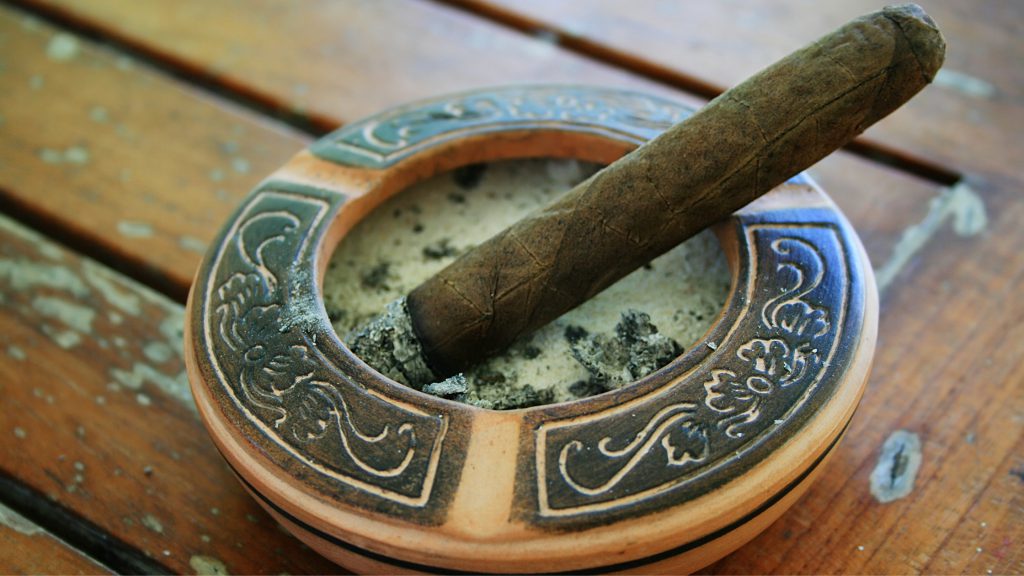
Wrapping Up: The Art of Preserving Cigars
As we conclude our exploration of cigar longevity, it’s clear that the lifespan of a cigar is influenced by a myriad of factors.
From the quality and type of the cigar to the frequency of smoking and, most importantly, the storage conditions – each aspect plays a significant role in determining how long a cigar lasts.
We’ve learned that cigars, much like fine wines, can improve with age under the right conditions. A well-stored cigar kept at the optimal temperature and humidity, can maintain its quality and flavor for many years. However, without such care, a cigar’s lifespan can be drastically reduced.
The importance of a good humidor cannot be overstated. This specially designed storage box maintains a constant humidity level, providing an ideal environment for cigars.
Whether you’re a seasoned cigar smoker or a novice, investing in a quality humidor and learning to maintain the right humidity levels is key to preserving your cigars.
In the end, the art of cigar preservation is a journey of learning and appreciation. It’s about understanding the delicate nature of cigars and creating the right environment for them to thrive.
So, invest in a good humidor, store your cigars properly, and enjoy the rich flavors and aromas that a well-preserved cigar has to offer.
Frequently Asked Questions about Cigars and Their Lifespan
Q1: How long can cigars last without a humidor?
A: Without a humidor, cigars can start to dry out in as little as two days, depending on the humidity of the environment. In a very humid environment, they might last a week or two. However, without proper storage, they’ll eventually lose their flavor and become difficult to smoke.
Q2: Can you revive a dried-out cigar?
A: Yes, it’s possible to revive a dried-out cigar, but it’s a delicate process that can take several weeks. The cigar needs to be re-humidified slowly to prevent the wrapper from cracking. If a cigar is extremely dry or has been improperly stored for a long time, it may not be salvageable.
Q3: How often should I rotate my cigars in a humidor?
A: It’s a good practice to rotate your cigars every few months. This helps ensure that all cigars are evenly exposed to the humidity within the humidor, which can help maintain their quality and extend their lifespan.
Q4: Can cigars go bad in a humidor?
A: While a humidor is designed to preserve cigars, it can still go bad if the humidor isn’t properly maintained. If the humidity levels get too high, it can lead to mold growth. Conversely, if the humidity is too low, the cigars can dry out. Regularly checking and adjusting the humidity levels can help prevent these issues.
Q5: Do cigars get better with age?
A: Much like wine, many cigars do get better with age. The flavors can become more complex and refined over time. However, this is generally true for higher-quality, hand-rolled cigars. Lower-quality cigars may not benefit as much from aging.

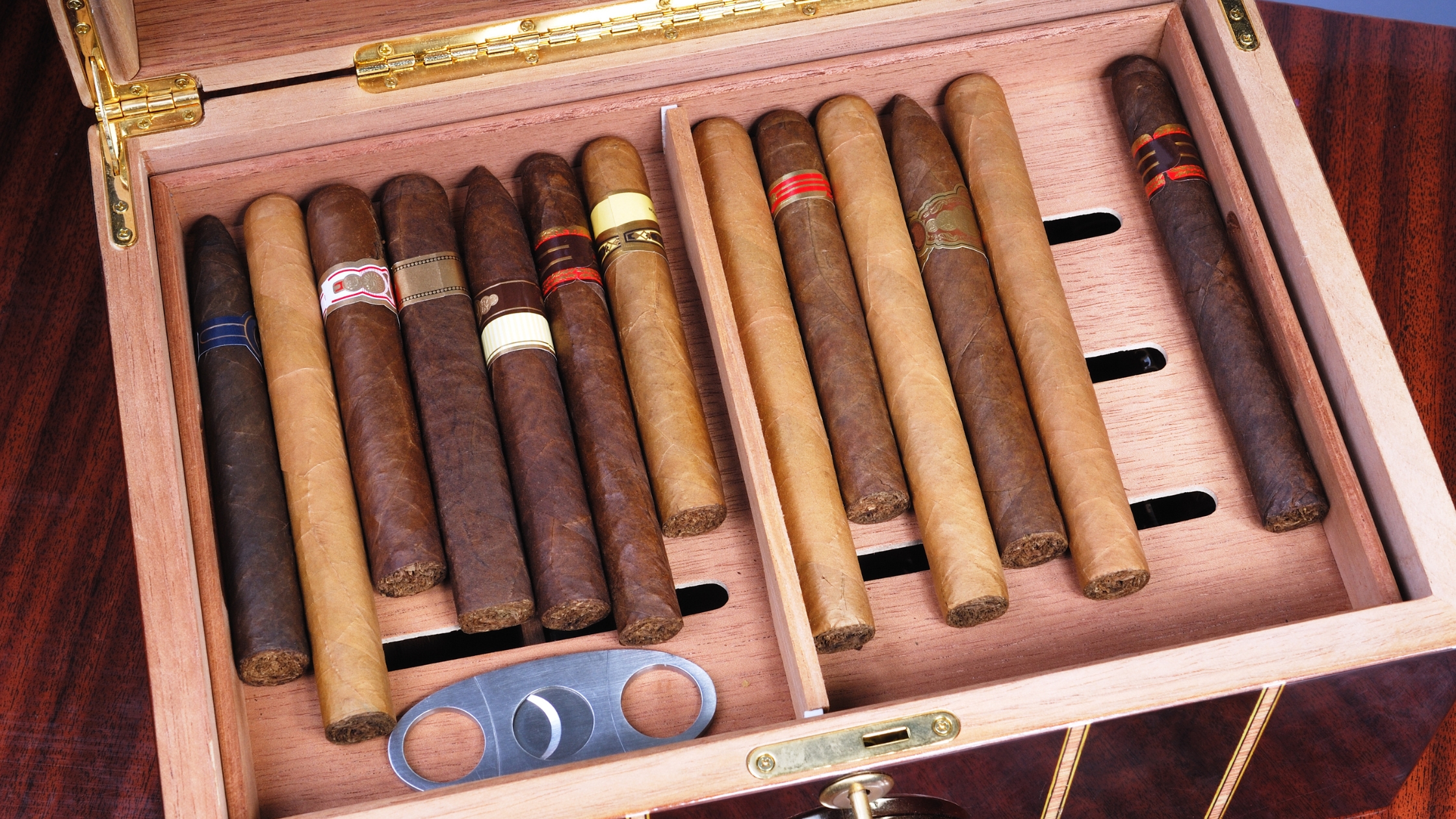


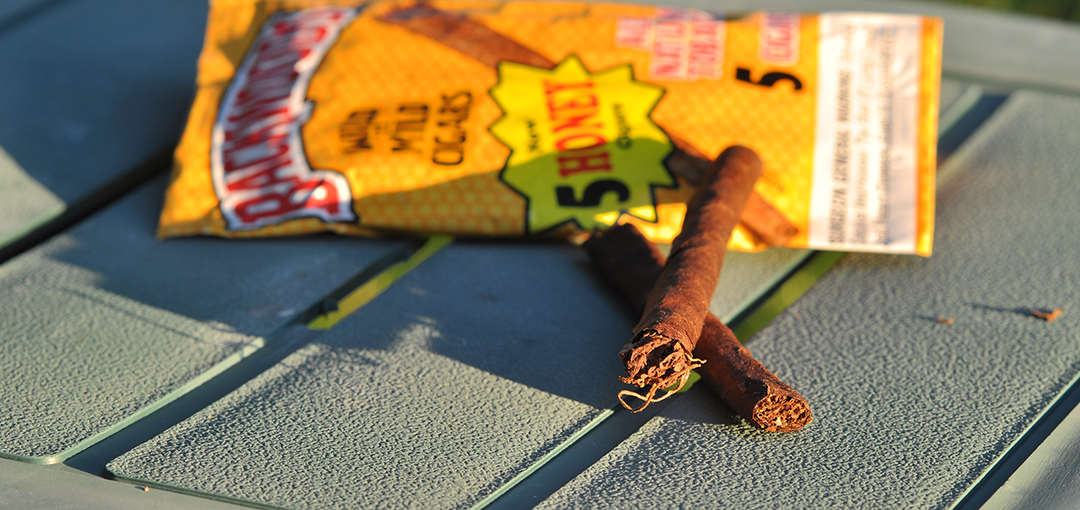

Recent Comments